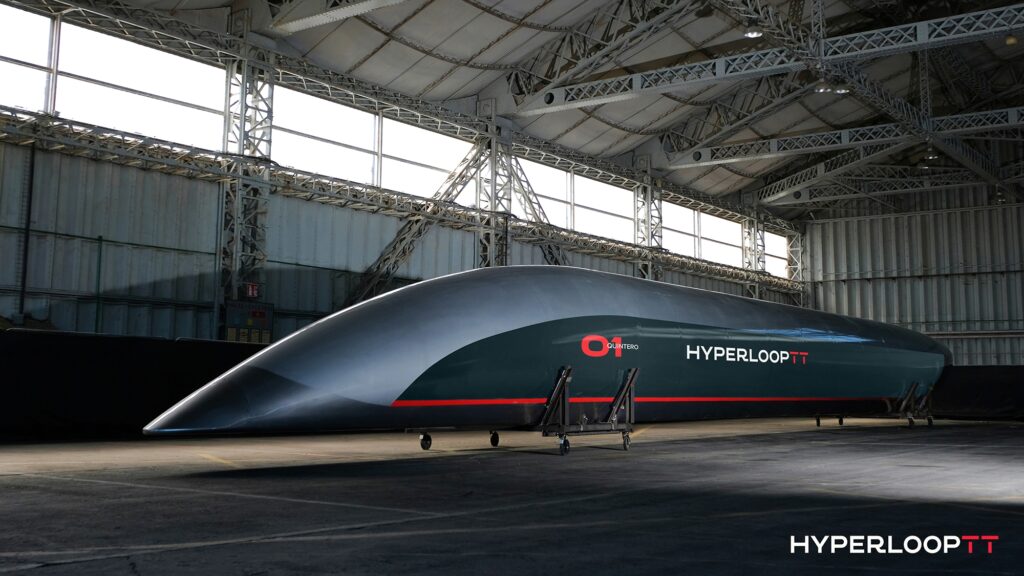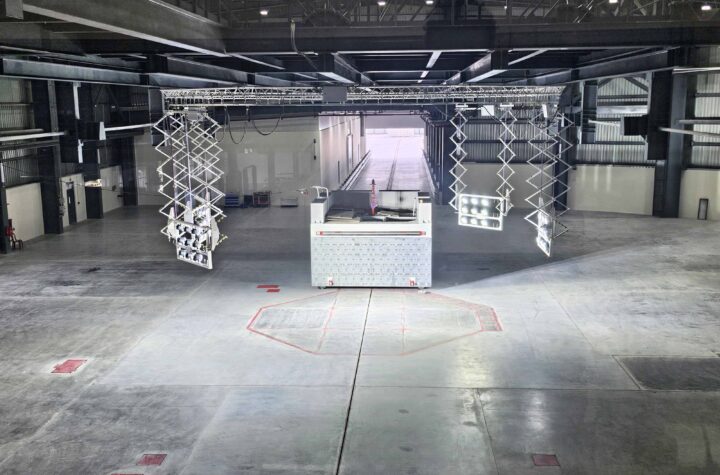
In an exclusive interview with Andrés de León, CEO of Hyperloop Transportation, Automotive Industries delves into the strategic decision behind relocating HyperloopTT’s European operations from Toulouse, France, to Veneto, Italy. The insightful conversation explores the factors influencing this move and its alignment with the company’s long-term objectives.
Initially rooted in Toulouse, France, as a pivotal hub for testing and collaboration, HyperloopTT realized the need for a larger facility to prove its groundbreaking technology—ultimately leading to the decision to move operations to Veneto, Italy. The discussion highlights the critical role played by Toulouse in hosting global regulatory bodies and industry leaders, setting the stage for HyperloopTT’s expansion.
The interview further explores the significance of the ‘Hyper Transfer’ contract signed in January 2024, positioning it as a landmark development in the hyperloop industry. The CEO emphasizes its uniqueness as the only contract worldwide offering a path to a commercial hyperloop system, underscoring HyperloopTT’s triumph over competitors.
With the relocation involving the transportation of various components, including capsules and control centers, the conversation touches upon the anticipated challenges during the transition. Andrés de León provides insights into the efficient transmission of components and the recycling of tubes, emphasizing the phased construction of new tube systems at the chosen Italian site.
Collaboration emerges as a key theme in the interview, with HyperloopTT’s success in Toulouse attributed to partnerships with over twenty local entities. The CEO outlines the company’s collaborative approach in Italy, working closely with established players like Webuild and Leonardo, and highlights the unique challenges faced by Hyperloop as both a mobility startup and infrastructure project.
The discussion then delves into the role of new facilities in Veneto, Polytechnic of Turin, and Puglia in supporting the development and testing of Hyperloop technology. Collaboration with Italian partners is emphasized as crucial for gaining insights into the Hyper Transfer phases, including prototype construction and station location considerations.
Notable achievements in Toulouse, such as the 320-meter test track and control systems development, are explored for their contributions to the overall progress of Hyperloop technology. The interview concludes with a focus on safety and efficiency, particularly with the development of an Operations Control Center and Traffic Management System in partnership with Hitachi Rail.
As HyperloopTT dismantles its first track in Toulouse, the interview sheds light on the challenges and opportunities presented by this transition. The CEO emphasizes the company’s commitment to maintaining relations in Toulouse while exploring new opportunities for R&D centers in collaboration with regulators globally.
Looking forward, the interview concludes by exploring HyperloopTT’s primary goals and milestones in Italy and their broader vision of revolutionizing high-speed travel globally. The significance of Italy in legitimizing hyperloop on the global stage and reigniting interest in other regions is highlighted, making it clear that Hyper Transfer is poised to be the first of many similar projects worldwide.
Automotive Industries interview with Andrés de León, CEO, Hyperloop Transportation
Automotive Industries: Hi Andrés, why did HyperloopTT decide to move its European operations from Toulouse, France, to Veneto, Italy? What factors influenced this decision, and how does it align with the company’s long-term goals?
HyperloopTT: Firstly, Toulouse set the stage for many of our activities in Europe and the rest of the world. It allowed us to perform some critical testing and proved invaluable to us for hosting the global community of regulators like the US Department of Transportation, Italy’s CAV and member of the European Commission as well transportation industry leaders like Leonardo, Webuild, etc. A few years into our development, we realized that the facility at Franzacal airbase in Toulouse would not be sufficient to prove our technology, for that we needed several kilometers, ideally 10.
Automotive Industries: Can you elaborate on the significance of the contract for ‘Hyper Transfer’ signed in January 2024? How does this project fit into HyperloopTT’s overall strategy, and what milestones do you expect to achieve with it?
HyperloopTT: The Hyper Transfer contract is the most significant development in the hyperloop industry to date. For now, it is the ONLY hyperloop contract in the world that provides a path to a commercial system. We expect this to be the first commercial hyperloop system in the West. In China they are already breaking speed records with their hyperloop system. For HyperloopTT this was a major and historic win as we successfully won this contract over all our competitors.
Automotive Industries: Moving to Italy involves transporting various components, including capsules, vacuum pumps, control centers, and propulsion systems. How does this relocation impact ongoing projects, particularly the Hyper Transfer project, and what challenges are anticipated during the transition?
HyperloopTT: We’ve constructed many of our components within shipping containers like our vacuum pumps and control center, these will easily be transmitted by truck or boat to Italy once we settle on the final destination. The capsules will go by truck too . Our tubes will be recycled as we will build new tube systems at the site we determine in phases one and two of the Hyper Transfer project.
Automotive Industries: Collaboration has been a key aspect of HyperloopTT’s success in Toulouse, working with over twenty local and regional entities. How will the company continue fostering collaborations in Italy, and what role do you see local partnerships playing in the success of future projects?
HyperloopTT: Our company is built on collaboration. Our crowd collaboration model has enabled us to continue on where other companies have had to shutdown. It allows us to work in a way that is more efficient than your typical capital intensive start up. We approached the Italy project in the same way we have done everything from developing our technology to recruiting talent, by collaborating closely with some of Italy’s biggest companies like Webuild and Leonardo we came to the table with well established players in the country. From our view, Hyperloop is not like a typical mobility startup. Hyperloop is also infrastructure and perhaps faces unique challenges as a result. We have had to put a lot of effort into safety and regulatory factors.
Automotive Industries: The Toulouse facility has played a crucial role in achieving significant testing milestones. How will the new facilities in Veneto, Polytechnic of Turin, and Puglia support the continued development and testing of Hyperloop technology?
HyperloopTT: By working with our partners in Italy, we will have critical insights and input into moving through the Hyper Transfer phases. Where to build the prototype, where to consider station locations, how to predict ridership etc. We can only know these things by working directly with universities like Polytechnic and stakeholders in Veneto Region . We took nearly and identical approach to the Great Lakes Feasibility Study.
Automotive Industries: Could you provide insights into the advancements made during the testing milestones in Toulouse, especially with regards to the 320-meter test track and the various control systems developed? How do these accomplishments contribute to the overall progress of Hyperloop technology?
HyperloopTT: Toulouse allowed us to prove the technology to investors, industry partners, and regulators. Technology wise we were able to do the following:
- Test intensively our vacuum system
- Test the different challenges of our propulsion and levitation system
- Create our Operation control Center
- And multiple more pieces of the technology that have been analysed and tested
Automotive Industries: With the development of an Operations Control Center (OCC) and Traffic Management System in partnership with Hitachi Rail, how does HyperloopTT envision ensuring the safety and efficiency of its hyperloop systems? How will these control systems be adapted to the new operational locations in Italy?
HyperloopTT: The traffic management system developed is base on ERTMS, a system that is used in abundance throughout Europe. We expect this technology to be highly compatible with Italian and worldwide safety standards.
Automotive Industries: The dismantling of the first track in Toulouse is underway. What challenges and opportunities does this present, and how will it impact ongoing projects and the timeline for future developments?
HyperloopTT: We are not leaving Toulouse completely. We need to keep our team developing relations in the area and managing the ones that we have built during these years. Our milestones and demonstrations at Toulouse have paved the way for many things. Toulouse welcomed us back in 2017, fairly early in our development. We made the decision to build at what we called ‘commerial scale’ when, at the time other companies were building at scales we knew to be too small for commercial deployment. For this reason most of our technology will be able to be incorporated into the Hyper Transfer prototype. We’ve been in discussions with other regions to develop R&D centers where we will be able to work alongside regulators in both the US and Middle East, we hope to share more about this soon.
Automotive Industries: HyperloopTT has been a pioneer in creating the first new form of transportation in over a century. Looking ahead, what are the company’s primary goals and milestones in Italy, and how does this move contribute to the broader vision of revolutionizing high-speed travel globally?
HyperloopTT: Italy is significant in that it has legitimized hyperloop with many parts of the world. With China building as well, we think that Hyper Transfer will be the first of many similar projects around the world. We have been actively engaged with transportation planning committees on nearly every continent for many years now. Italy has reignited interest in exploring hyperloop’s many advantages in these regions once again.









More Stories
MESSRING completes new crash test facility for Mahindra in India
ROHM Develops an Ultra-Compact MOSFET Featuring Industry-Leading* Low ON-Resistance Ideal for Fast Charging Applications
More than 30 of the top 50 global suppliers have production facilities in Turkey